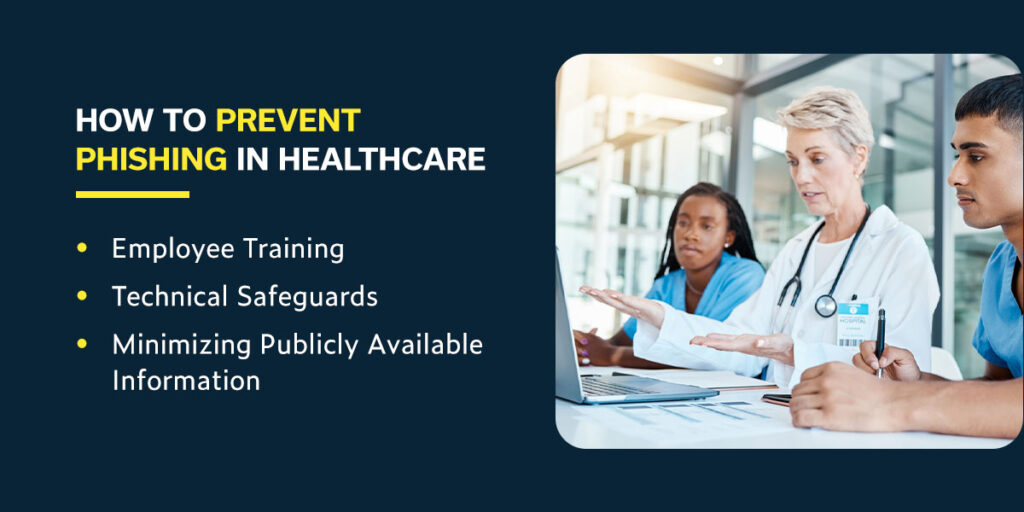
How to Protect Healthcare Data From Phishing
Protecting sensitive patient information is critical in today’s digitized healthcare landscape. The prevalence of phishing attacks in healthcare has reached alarming proportions, posing a substantial threat to data security. According to recent statistics, phishing is the leading cause of cyberattacks in the healthcare sector.
But what is phishing? It’s not only deceptive emails — it also takes the form of voice-based and SMS-based attacks. Cybercriminals relentlessly pursue unsuspecting employees who inadvertently grant access to confidential data by clicking seemingly harmless links.
The consequences of a healthcare data breach are severe, with an average financial loss reaching nearly $11 million in 2023. This financial burden, coupled with the potential for serious patient harm and disrupted emergency services, underscores the urgency of safeguarding healthcare data.
This blog explores effective strategies to protect healthcare data from phishing attacks, empowering professionals with the knowledge to defend against this pervasive threat.
Understanding Phishing in Healthcare
In healthcare, the term “phishing” takes on a particularly ominous meaning. Phishing attacks in healthcare involve cybercriminals deploying cunningly deceptive tactics to trick employees into divulging sensitive information — often through seemingly innocuous emails, messages or phone calls.
These attacks are severe threats with dire consequences. A phishing attack in healthcare can lead to compromised patient data, unauthorized access to medical records and financial losses. They are more than financial burdens — they can severely harm patients and disrupt essential services.
For instance, in 2021, 32% of cyberattacks in healthcare impacted patient safety. Even more concerning, 26% of these attacks disrupted devices and systems, affecting IT operations and putting lives at risk.
It’s impossible to overstate the criticality of proactive prevention. With phishing attacks representing a significant portion of cyberattacks in healthcare, organizations and professionals must equip themselves with the knowledge and tools to protect healthcare data from phishing.
Common Phishing Tactics in Healthcare
In the ever-evolving cybersecurity landscape, healthcare professionals must be well-versed in common phishing tactics that threaten data integrity. Recognizing these tactics is the first line of defense in protecting sensitive patient information and maintaining the sanctity of healthcare operations. Here are a few common phishing attacks in healthcare.
Email-Based Attacks
Phishing in healthcare often comes in the form of deceptive emails. Cybercriminals meticulously craft legitimate messages using alarming subject lines or mimicking trusted sources. They may impersonate colleagues, administrators or governmental agencies to persuade recipients to click on malicious links or download infected attachments. Recognizing these suspicious emails is essential. Look for telltale signs like generic greetings, poor grammar and unfamiliar sender email addresses.
Social Engineering Tactics
Phishers prey on human psychology. They exploit emotions like fear or curiosity to manipulate healthcare employees into taking actions that compromise security. For instance, they might send emails with fake urgency, like purported patient emergencies, or employ psychological tricks to make recipients feel obligated to respond promptly. Awareness of these manipulative tactics is critical to thwarting their effectiveness.
Impersonation and Spoofing
In healthcare, attackers often impersonate trusted entities, whether it’s a superior within the organization, a co-worker or a legitimate business partner. They skillfully mimic email addresses or websites, making it challenging to discern the deceit. The goal is to gain trust and persuade targets to share sensitive information. Always verify requests’ legitimacy, especially when they involve sensitive data or financial transactions.

How to Prevent Phishing in Healthcare
Preventing phishing attacks in healthcare is crucial, given their severe repercussions on patient data and healthcare operations. Let’s explore comprehensive strategies to safeguard healthcare data from phishing attacks and equip you with the knowledge and tools to fortify your defenses.
Employee Training
Education and awareness are pivotal in preventing phishing attacks in healthcare. Consider implementing a comprehensive training programs that empower employees to effectively recognize and respond to phishing attempts.
Training programs should educate employees about the various forms of phishing attacks, emphasizing the critical need for vigilance when handling emails, messages and other forms of digital communication. By imparting knowledge about the tactics and indicators of phishing, employees can become the first line of defense against these threats.
Practical training through simulated phishing campaigns can be highly effective. By exposing employees to real-world scenarios, organizations can measure their susceptibility to phishing and tailor training accordingly. Tracking improvements in employees’ ability to identify phishing attempts, as demonstrated through lower click rates in subsequent simulations, is a critical success metric.
Successful employee training strengthens cybersecurity and instills a culture of responsibility and security awareness within healthcare organizations.
Technical Safeguards
Robust technical safeguards can bolster your defenses against phishing in healthcare. These measures are essential for preventing malicious emails from reaching their targets and mitigating the potential impact of phishing incidents. Let’s explore a few technical safeguards.
- Email filtering and blacklists: Healthcare providers should implement advanced email filtering systems to identify and quarantine inbound phishing attempts. Phishing blacklists can enhance security by isolating messages from known spam sources, reducing the chances of an employee inadvertently clicking on a malicious link.
- URL filters for web browsers: URL filtering technology restricts access to malicious websites attackers use to collect user credentials or install malware. By preventing users from visiting these dangerous sites, medical organizations can minimize the risk of falling victim to phishing schemes that lead to data breaches.
- Multifactor authentication: MFA renders stolen credentials ineffective by requiring users to verify their identity through a registered device or additional authentication methods. Even if an attacker acquires login information through a phishing attempt, they would still need the secondary authentication factor — significantly reducing the chances of unauthorized access.
By adopting these technical safeguards, you can proactively fortify your cybersecurity posture and reduce your susceptibility to phishing attacks.
Minimizing Publicly Available Information
To strengthen defenses against phishing attacks, your organization must vigilantly minimize publicly available information. By reducing their digital footprint, medical providers can make it harder for cybercriminals to launch successful phishing campaigns.
Cybercriminals often search for email addresses and contact details on organizational websites to fuel their phishing attempts. By keeping this information confidential, you can thwart attackers seeking to exploit it maliciously.
Cybercriminals can also use publicly available data in spear-phishing attacks, meticulously crafting emails to target specific people within an organization. By limiting the amount of publicly accessible data, healthcare organizations can lower their risk of falling victim to these highly personalized and potentially devastating phishing tactics.
Taking these precautions can significantly diminish your organization’s public profile, making it less appealing to cybercriminals and enhancing overall security against phishing attacks.
Use a Cybersecurity Provider
Collaborating with cybersecurity professionals can be essential to fortifying your defenses against the relentless wave of phishing attacks in healthcare. Outsourcing IT services to a specialized cybersecurity firm offers several advantages. They bring expertise that extends beyond what an in-house team can provide.
Enlisting professional assistance can benefit your healthcare institution in various ways.
- Specialized knowledge: Cybersecurity providers are well-versed in the intricacies of healthcare-specific threats, making them uniquely equipped to combat phishing attacks tailored to the industry.
- Advanced technologies: These experts leverage state-of-the-art technologies and best practices to bolster defenses and swiftly respond to emerging threats.
- Constant vigilance: A dedicated cybersecurity partner offers round-the-clock monitoring and immediate incident response, reducing the impact of potential breaches.
In the ongoing battle against phishing attacks in healthcare, partnering with cybersecurity professionals can make all the difference. With their support, your business can safeguard sensitive patient data, maintain trust and ensure the integrity of their operations.

Partner With Prelude Services, Your Trusted Cybersecurity Ally
In an age where healthcare data is a prized target for cybercriminals, fortifying your defenses against phishing attacks is not merely a choice — it’s a mandate. We’ve outlined comprehensive strategies to protect healthcare data from phishing attacks. But now, it’s crucial to act. Healthcare professionals, administrators and IT teams must unite in implementing these preventive measures.
The fight against phishing requires expertise and unwavering dedication. With our two decades of cybersecurity excellence, Prelude Services is your strategic partner. We offer a suite of cybersecurity services, including phishing testing, vulnerability scanning, multifactor authentication and more.
Let’s fortify your healthcare organization’s cybersecurity defenses together. Protect the invaluable healthcare data under your care. Contact us online today — your shield against phishing starts here.
CONTACT PRELUDE SERVICES FOR 24/7 IT SUPPORT
Technology has become a crucial part of the modern business experience. Without functional computers and mobile phones, many business practices would grind to a halt. Unfortunately, breakdowns and malfunctions are an inevitable part of any machine, meaning businesses do grind to a halt until the issues are fixed. In order to keep your business running, it's crucial to have access to IT support when you experience technical difficulties.
If you're a healthcare company, long-term care provider, or small business in need of IT support at all hours, consider Prelude Services. We're a SSAE SOC
Compliant business dedicated to improving your security and functionality. We offer specific IT services for senior living care, nursing homes, retirement home services and assisted living, including 24/7 IT support. If you want to know how Prelude can help you, contact us today!
